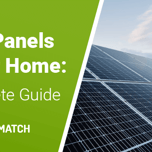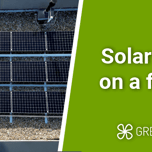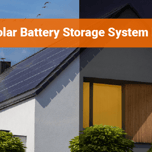Answer these simple questions and we will find you the BEST prices
Which type of solar quotes do you need?
It only takes 30 seconds
100% free with no obligation

Get up to 4 quotes by filling in only 1 quick form

Slash your energy bills by installing solar panels

For the average 2-3 bedroom house
- GreenMatch
- Blog
- Solar Panel Cost
Solar Panel Costs UK (Updated: October 2025)

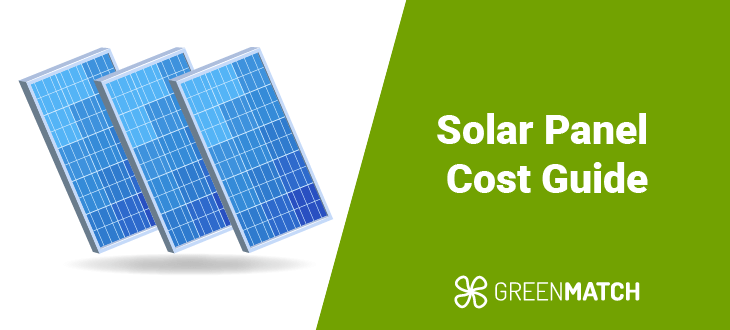
- A typical 4kW solar panel system for 2-3 bedroom houses costs £6,600 - £8,100 with installation. Added together, the total cost of solar panels and a battery in the UK is £13,000 - £15,500.
- A 4kW system breaks even in 7 - 6 years, with annual electricity cost savings of between £783 and £1,567.
- Adding a solar battery can help reduce homeowner's electricity bills by as much as 70%.
- 0% VAT scheme can save between £1,000 - £3,000 on installation costs.
In 2023, installing a 4kW solar panel system would set you back at least £7,000. Fast forward to today, October 2025, and that price has dropped closer to £6,000— resulting in a 16% dip since May 2023. Basically, solar power is becoming more affordable than ever for people in the UK!
As of February 2024, 1.4 million homeowners have solar panels installed– an increase of 6% from the previous year.
A new solar panel system can be a significant investment, but costs can be minimised by comparing multiple quotes. GreenMatch simplifies this process, offering up to 4 tailored quotes quickly and easily—just fill out our 30-second form and we’ll do the rest.
Our service is free with no obligations. Click the button below to get started.
- Quotes from local engineers
- Payment by finance available
- Save up to £1,567 per year
It only takes 30 seconds



- Are solar panels worth it?
- Solar panel costs: System, labour, maintenance & insurance
- Solar panel prices in the UK are decreasing in 2024
- Bring down costs with solar panel grants
- Earn extra savings through the Smart Export Guarantee
- Maximise your returns from solar
- Factors affecting solar panel costs
- Guide to getting the best solar deal
- Frequently asked questions
Are solar panels worth it?
| Household size | System size | System cost + installation | Annual savings | Break-even period | Savings after 25 years |
|---|---|---|---|---|---|
| Small; 1-2 bedrooms | 2kW | £3,800 - £4,600 | £783 | 7 years | £19,578 |
| 3kW | £5,700 - £7,000 | 7 years | |||
| Medium; 2-3 bedrooms | 4kW | £6,600 - £8,100 | £1,304 | 6 years | £32,608 |
| 5kW | £8,300 - £10,200 | 6 years | |||
| Large; 4-5 bedrooms | 6kW | £10,000 - £12,200 | £1,567 | 6 years | £39,163 |
Savings estimates are calculated based on the national average household energy consumption and the current price of electricity (Ofgem). This is a broad estimate, and figures may vary according to the size, type, and quality of the solar panel system (November 2024). To estimate solar panel costs and savings for your household based on your location, use our solar panel cost calculator.
Are solar panels worth it? As of April 2024, a 4kW system priced between £6,600 - £8,100 could save you around £1,304 annually, with a break-even point in about 6 years.
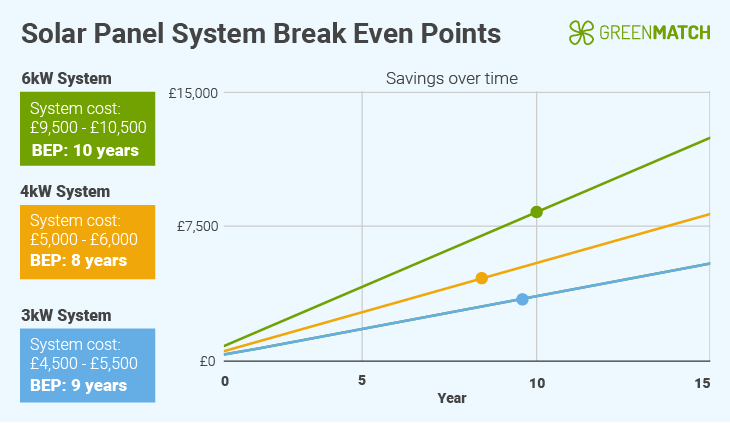
Plus, you can benefit from grants like ECO4 to help cover installation costs. Once installed, the Smart Export Guarantee can earn you up to £108 a year, based on the average tariff rate of 10.8p/kWh.
Even better, installing solar panels in a 2-3 bedroom house in the UK can increase the property value by 6.2% to 6.8%.
Solar panel costs: System, labour, maintenance & insurance
A combined solar panel system and battery setup can cost up to £15,500 for an average 2-3 bedroom home with a 4kW solar array and a 9 - 10 kWh battery.
| Household size | Annual electricity usage | System size | Battery size | System cost | Battery costs | Total costs |
|---|---|---|---|---|---|---|
| Small; 1-2 bedrooms | 1,800kWh | 3kW | 6 - 7 kWh | £5,700 - £7,000 | £5,000 - £8,000 | £9,500 - £13,500 |
| Medium; 2-3 bedrooms | 2,700kWh | 4kW | 9 - 10 kWh | £6,600 - £8,100 | £8,000 - £9,500 | £13,000 - £15,500 |
| 5kW | 11 - 12kWh | £8,300 - £10,200 | £9,000 – £10,000 | £16,500 - £20,500 | ||
| Large; 4-5 bedrooms | 4,100kWh | 6kW | 13 - 14kWh | £10,000 - £12,200 | £10,000+ | £22,000+ |
The estimates above outline the total costs expected for a system where the battery can fully charge to its maximum capacity.
In the following sections, we'll take a look at how other important factors might influence the total costs, besides solar battery prices.
Solar panel labour costs
In the UK, labour costs for solar panels will be included in the overall price quotes by your installer. In general, labour costs will make up 25-30% of your total installation costs.
The most common way to calculate the labour costs of a solar panel installation is to charge 20p per watt. So, for a 4kW system, you would pay 20p for 4000 watts, which comes to £800.
| System size | Price per watt | Price per day | Total cost (2-3 days) | System cost + installation |
|---|---|---|---|---|
| 2kW | 20p | £400 | £800 - £1,200 | £3,800 - £4,600 |
| 3kW | 20p | £600 | £1,200 - £1,800 | £5,700 - £7,000 |
| 4kW | 20p | £800 | £1,600 - £2,400 | £6,600 - £8,100 |
| 5kW | 20p | £1,000 | £2,000 - £3,000 | £8,300 - £10,200 |
| 6kW | 20p | £1,200 | £2,400 - £3,600 | £10,000 - £12,200 |
Several factors can impact labour costs, including:
- Installation complexity: Factors like rooftop accessibility, roof condition, and the complexity of the electrical wiring can all influence labour requirements.
- Regional variations: Labor costs differ by region, with urban areas such as London typically charging higher rates due to greater demand and higher living expenses.
Labour costs are typically included in solar installation quotes but can vary significantly between installers. Comparing detailed quotes from multiple installers helps you to clarify these costs and find the best rates.
- Quotes from local engineers
- Payment by finance available
- Save up to £1,567 per year
It only takes 30 seconds



Solar panel maintenance & insurance cost
Solar panel insurance is recommended in case they are damaged and need to be repaired. However, in the UK, solar panel coverage is often included in standard home insurance policies. With that being said, it’s important to review the specifics of this coverage and consider additional policies if needed.
Specialised solar panel insurance can provide broader coverage than standard home insurance, protecting against risks like storms, theft and damage.
Additional considerations include coverage for ground-mounted panels, which may not be included in typical home insurance, and for batteries and inverters, which may require extra coverage for damage not covered by warranties.
The table below outlines typical solar panel insurance costs and factors that may impact your premiums.
| Cost factor | Typical cost range | Additional info |
|---|---|---|
| Annual Home Insurance Premium Increase | £118 to £152 per year | Varies based on property value and coverage |
| Typical Solar Panel Insurance Cost | £400 to £1,600 (one-time) | Depends on system size and coverage |
| Solar Insure Coverage | ~£0.10 per watt installed | Varies with installer, equipment, and coverage package |
| Homeowners Insurance Increase | £10 to £20 per month | Check with the insurance provider |
For general maintenance, you can schedule an annual service with your installer or a certified professional for £100–£200 or do it yourself for free. The most expensive maintenance will come from replacement of certain components, as shown in the table below.
| Cost factor | Typical cost range | Additional info |
|---|---|---|
| Repair | £150 to £350 | May be covered under warranty |
| String Inverter Replacement | £1,000 to £2,000 (every ~10 years) | Typically needed once per decade |
| Battery Storage (Optional) | £5,000 to £15,000 | Price decreasing, but still significant |
Annual maintenance checks aren’t always required, and most solar systems include monitoring through the inverter, making it easy to check monthly for any issues.
Solar panel prices in the UK are decreasing in 2024
In the past decade, solar panel prices have significantly decreased, with the installed price of residential systems dropping by 26% from 2013 to 2022. Meanwhile, the cost of solar PV modules alone, not including installation, has fallen by 90% since 2000.
The average price per watt for solar panels was around £2.50 in 2013, but by 2023, it has decreased to approximately £1.50 per watt.
Despite the long-term downward trend, the solar market has experienced some volatility in recent years. In 2022, supply chain challenges and inflation caused price increases. By 2023, prices began to fall again as supply chain issues eased. Check out this continued downward trend in the graph below.

Source: GOV.UK
In summary, there has been a 20% decrease in prices for systems ranging from 0 to 4 kW since March 2023, while systems between 4 and 10 kW have seen a 15% decrease in the same period.
Bring down costs with solar panel grants
In the UK, there are several government grants and schemes to promote solar panels.
These include free solar panel grants, loans, and VAT reductions. Below we've provided an overview of some of the most notable grants available today.
| UK solar grants | Run time | Potential savings | Eligibility |
|---|---|---|---|
| 0% VAT | April 1st 2022 – March 2027 | £2,850 for 2-3 bedroom homes (4kW solar panels + battery) | All UK buyers |
| Energy Company Obligation 4 (ECO4) | April 1st 2022 – March 2026 | Partially or fully FREE solar panel possibility | Your household income is below £31,000, or someone in your household has a health condition worsened by a cold home. |
| Smart Export Guarantee (SEG) | January 1st 2020 – (indefinite) | Additional £45 to £80 (£440 to £660 total energy savings) | Any solar panel owner |
| Home Energy Scotland Grant and Loan | June 2023 - June 2024 | £6,000 (£1,250 grant + £4,750 optional loan) | Means-tested for low income or home energy performance |
| Home Upgrade Grant (HUG) | September 2023 - March 2025 | Up to £10,000, dependent on region or property type | Homes with energy performance rating of D to G |
| Public Sector Decarbonisation Scheme (PSDS) | April 2023 - April 2025 | Regionally dependent | Companies and institutions looking to decarbonise |
Earn extra savings through the Smart Export Guarantee
The Smart Export Guarantee (SEG) allows homeowners and small businesses with solar panels to earn payments for surplus electricity sent back to the grid. Systems up to 5 MW (1,000 times the size of a typical home system) qualify, and a smart meter is required to measure exports accurately.
A solar battery can store excess solar panel energy for later use or export under an SEG tariff. Some energy suppliers offer special rates for electricity exported from batteries, which may impact overall battery storage costs.
Note that SEG eligibility requires MCS-certified installations, so DIY systems are ineligible unless installed by an MCS-certified professional.
Through the Smart Export Guarantee, you can save an additional £470 per year. Take a closer look at what you can earn below.
SEG savings based on an average tariff rate of 10.8p/kWh, and the maximum tariff rate of 30.3p/kWh. (November 2024)
SEG tariff rates vary widely, from 6 p/kWh to a high of 30.31 p/kWh with Octopus Energy's Intelligent Octopus plan, offering potential annual savings of £875 for an average-sized home with a 4kW system.
Most of these plans are exclusive to current customers.
| Energy supplier | Tariff (p/kWh) | Customer only |
|---|---|---|
| Octopus Energy (Intelligent Octopus) | 30.31 | Yes |
| Octopus Energy (Flux) | 21 | Yes |
| Good Energy (Exclusive) | 20 | Yes |
| So Energy (So Bright) | 20 | Yes |
| OVO Energy (Exclusive) | 20 | Yes |
| E.ON (Next Export) | 16.5 | Yes |
| Good Energy (Solar) | 15 | Yes |
| ScottishPower (SmartGen) | 12 | No |
| British Gas (Flex) | 6.4 | No |
| Rebel Energy (SEG) | 6 | No |
For a comprehensive list of tariff rates and potential savings, check out our Best SEG Tariff in the UK page.
Maximise your returns from solar
The list below outlines some of the key ways you can optimise your solar panel system and installation to ensure you maximise your savings:
-
Optimal panel placement: In the UK, solar panels perform best when tilted at an angle between 30° and 40°. For maximum energy production, they should ideally be installed on a south-facing roof, though east and west orientations are also effective. North-facing roofs are the least efficient but most homes in the UK have the opportunity for optimal panel placement.
-
Monitor system performance: A solar panel smart metres track real-time data, including voltage and weather conditions, to continuously assess the performance of your system. Monitoring lets you spot potential issues early, preventing energy loss or costly repairs by catching problems before they become serious. These are often included in system quotes. Smart meters will also automatically take half-hourly readings and send them directly to your SEG licensee.
-
Battery energy storage options: The UK Government’s Smart Export Guarantee (SEG) compensates solar PV owners for surplus energy they export to the grid. By incorporating battery storage, you can store excess energy generated during the day and sell it back to the grid during peak evening hours. Regulated suppliers must provide export options for eligible microgenerators. Residents in England, Scotland, and Wales may qualify for SEG tariffs.
-
Get a grant: Solar panel grants like the ECO4 scheme can help consumers get free solar panels in the UK. Currently, there is 0% VAT on solar panels, batteries, and other renewable energy products, allowing for a discount of over £2,850 on the purchase of a 4kW system.
- Compare quotes: Collecting quotes from multiple reputable installers is a sure way to get a good local deal since you can compare offers and choose the deal that best suits your needs.
If you're wondering how to get started on getting your quotes, then look no further than GreenMatch's quotes service. We can save you hours of strenuous research by providing you with tailored quotes directly, from the best installers near you.
All you have to do is fill in our 30-second form. Get started by clicking the button below.
- Quotes from local engineers
- Payment by finance available
- Save up to £1,567 per year
It only takes 30 seconds



Factors affecting solar panel costs
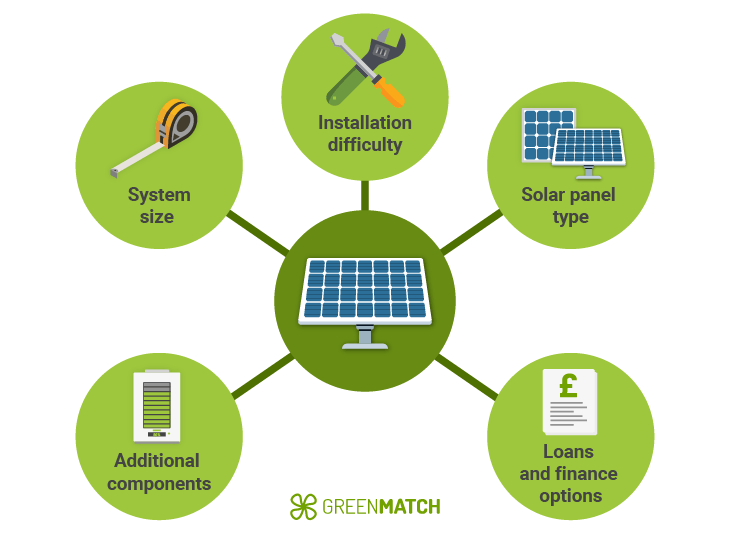
What are some additional factors to consider that might impact your total solar panel system costs? Take a look below:
Size system
A typical home in the UK will require a solar panel system between 2 - 6kW. An average system size of 4kW will cost around £6,600 - £8,100 including installation. The larger the solar panel system, the higher the installation cost. However, generally, the price per kW decreases the larger your system size is.
Solar panel types
Monocrystalline solar panels are the best type of solar panel in terms of efficiency. Although, there are 3 main types of solar panels used in the UK:
- Monocrystalline panels: Most commonly used in the UK. Also known as “black panels,” these have the highest efficiency but cost more (£1–£1.50 per watt).
- Polycrystalline panels: Slightly less efficient but cheaper (£0.90–£1 per watt).
- Thin-film panels: More flexible, usually less efficient, and used in specific applications.
Additional components
Installing additional components along with your solar panels can affect costs:
Solar batteries: £2,500 - £10,000 based on capacity.
- Pros: Stores excess solar energy during nighttime or cloudy days, reducing reliance on national grid, lowering energy bills, and earn money through SEG.
- Cons: High upfront costs.
Solar inverters: Around £800, with a replacement needed every 12 years.
- Pros: Convert solar power (DC) into usable household electricity (AC), making them a necessary part of any system.
- Cons: Inverters have a shorter lifespan than solar panels and will likely require replacement at least once.
Additional mounting equipment: Costs £100 - £300 per panel.
- Pros: Helps achieve the optimal angle for sunlight on flat roofs.
- Cons: Adds to installation costs and can increase the complexity of the setup.
Pigeon proofing: Prevents nesting and typically costs up to £600. Not a necessity.
- Pros: Prevents birds from nesting under the panels, which can cause damage and reduce efficiency. Also helps avoid the mess and maintenance issues from droppings.
- Cons: Not essential for every setup, so the extra expense may be unnecessary unless bird issues are a concern in your area.
Installation difficulty
Several factors during installation can increase installation costs:
- Roof material: Fragile materials like slate require special mounting, while metal or shingle roofs are simpler and more affordable to work with.
- Attic accessibility: Limited access complicates wiring and mounting.
- Wiring configuration: Older or complex wiring setups may need upgrades to support solar panels.
- Structural reinforcement: Some roofs require additional support for panel weight, especially on older buildings.
- Roof condition: Roof repairs, if needed, must be done prior to installation.
- Orientation and Layout: Complex layouts require custom panel arrangements to optimise sunlight exposure.
Solar panel loans & financing options
Solar panel financing options allow you to pay for your system in instalments over several months to 20 years. Common financing choices include:
- Monthly subscriptions through installation companies, personal loans, and government grants.
- Interest considerations: Financing can involve interest rates, typically 9.9%–14.9% annual percentage rate (APR), though some providers offer 0% rates.
| Subscription provider | Loan amount | Interest rate (APR) | Payment period | Estimated monthly payment | Estimated loan cost | Estimated amount to repay |
|---|---|---|---|---|---|---|
| Heatable | £11,295 | 9.9% | 10 years | £146 | £6,228 | £17,523 |
| Effective Home | £10,000 | 11.9% | 10 years | £140 | £6,728 | £16,728 |
| Green Central | £10,000 | 13.9% | 15 years | £130 | £12,876 | £22,876 |
While financing can make solar panels affordable initially, you may ultimately pay more than with an upfront purchase.
For detailed financing options, check out our article on solar panel loans and finance.
We asked solar panel expert Joshua M. Pearce, PhD more about what you can expect from solar panel loans and leasing in the UK:
Solar leasing is an option for homeowners without access to the capital to make the investment in solar. Consumers, however should be warned that solar provides a high return on investment that you only get to enjoy completely if you make it yourself. In general a solar lease can save you on your electricity bill, but you will save far more if you make the investment yourself.

Joshua M. Pearce is the John M. Thompson Chair in Information Technology and Innovation. He holds appointments at Ivey Business School and the Department of Electrical & Computer Engineering at Western University. He runs the Free Appropriate Sustainability Technology research group.
Guide to getting the best solar deal
When seeking solar panel quotes, it's important to consider several factors to ensure you're getting the best deal for your needs. Here's what to keep in mind:
- Evaluate total system cost: Look beyond the price of individual panels and consider the final price for the entire system, including installation, inverters, and any additional components.
- Installation expertise: Ensure your panels are installed by a professional MCS-certified installer. This will ensure your system performs as it should and makes you eligible for more government incentives.
- Home assessment: A reputable company should offer a thorough house survey to assess your roof's suitability, shading issues, and optimal panel placement.
- Powerline integration: Confirm that the quote covers the creation or modification of powerlines to connect your solar system to the grid.
- Warranties and guarantees: Check the warranties on both equipment and workmanship. Longer warranties can provide peace of mind and better long-term value.
- Financing options: If you're not paying cash, compare the financing terms offered by different installers.
- Compare multiple quotes: Compare at least 3 quotes from different installers to get a sense of the market prices and best deals available.
With countless installers available, finding a trusted one can be overwhelming. GreenMatch’s free quote service saves you hours of searching by connecting you with vetted installers tailored to your needs. Plus, there’s no obligation to accept any offer— it's completely free of charge.
Get started today by clicking the button below.
- Quotes from local engineers
- Payment by finance available
- Save up to £1,567 per year
It only takes 30 seconds



Frequently asked questions
An average 2-3 bedroom house with a 4kW solar panel system costs £6,600 - £8,100 with installation. Including a solar battery, the total cost is £13,000 – £15,500.
Solar panel grants in the UK include the ECO4 scheme, which helps consumers get free solar panels. Currently, there is 0% VAT on solar panels, batteries, and other renewable energy products, which could save you over £2,850 on the purchase of a 4kW system.
According to research, adding solar panels can increase property value between 6.2% to 6.8%.
In most cases, you will not need permission to install solar panels, as it is considered “permitted development”.
If you do need permission, make sure to contact the installers so they can help you with the application process.

Ciaran is a content writer at GreenMatch. Whether writing about sustainable aviation fuel or heat pumps, Ciaran has passion for informing readers about pivotal technologies that are reshaping our world.

We strive to connect our customers with the right product and supplier. Would you like to be part of GreenMatch?

- Solar Panel Costs UK (Updated: October 2025)
- Are solar panels worth it?
- Solar panel costs: System, labour, maintenance & insurance
- Solar panel prices in the UK are decreasing in 2024
- Bring down costs with solar panel grants
- Earn extra savings through the Smart Export Guarantee
- Maximise your returns from solar
- Factors affecting solar panel costs
- Guide to getting the best solar deal
- Frequently asked questions
- Quotes from local engineers
- Payment by finance available
- Save up to £1,567 per year
It only takes 30 seconds




